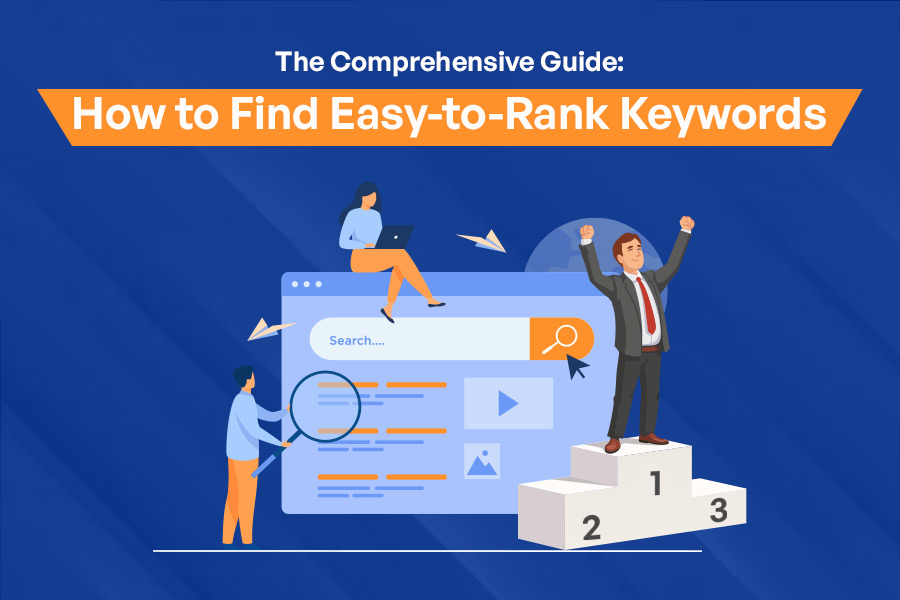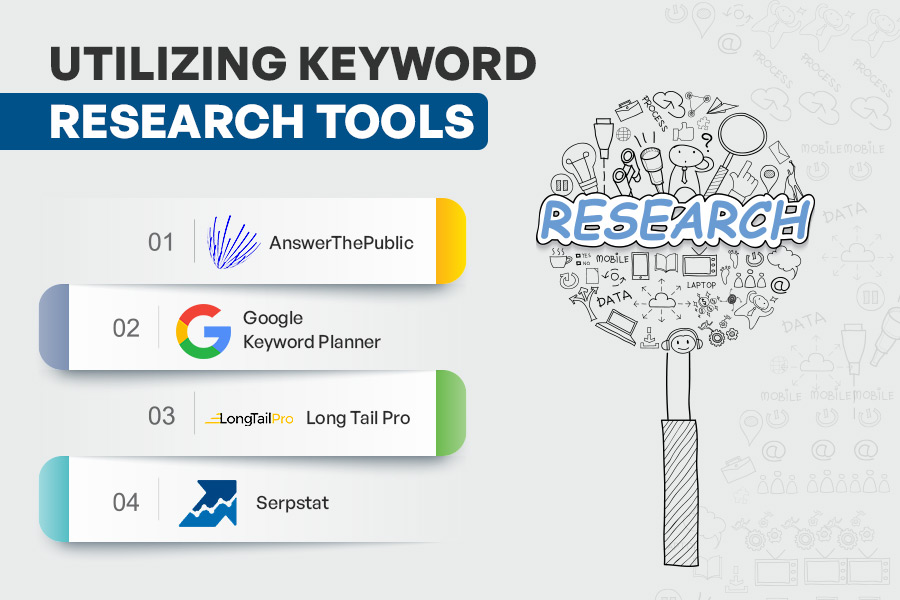Introduction
SEO can be daunting, especially for startups and small businesses trying to compete with well-established organizations. However, there are untapped keyword opportunities that can help your business rank well on search engines, even with a limited budget. In this guide, we'll walk you through the process of finding easy-to-rank keywords without relying on expensive tools.
As an experienced digital marketing expert, Jay Mehta understands the importance of finding easy-to-rank keywords to achieve higher search engine visibility and drive organic traffic to your website. By targeting the right keywords, you can significantly improve your search term ranking and outperform your competitors in the digital landscape.
In this comprehensive guide, we will discuss the essentials of identifying and utilizing easy-to-rank keywords to elevate your SEO strategy. We'll cover the basics of keyword research, various tools you can leverage, and best practices for optimizing your website to rank for these high-value search terms.
Understanding the Importance of SEO Keywords
Before diving into the process of finding easy-to-rank keywords, it's essential to understand why they matter. By focusing on SEO keywords that are less competitive yet still relevant to your target audience, you increase your chances of achieving a higher Google keyword ranking.
When users search for specific keywords or phrases, search engines like Google determine which websites are most relevant and authoritative. By optimizing your website for the right keywords, you signal to search engines that your content is valuable and deserves a higher ranking.
Importance of Seo Keywords
Define Your Goals
Before diving into keyword research, identify the primary goal(s) for your content. These goals can include brand awareness, lead generation, conversions, customer retention, or referrals. Focusing on one or two main objectives will lead to more effective content.
Conducting Keyword Research
The first step in finding easy-to-rank keywords is conducting thorough keyword research. This process involves identifying relevant keywords and phrases that your target audience is searching for and evaluating their competitiveness.
To start, ask yourself the following questions
What keywords should I use?
Brainstorm a list of topics related to your business or industry. Consider what problems your products or services solve and what questions your target audience may have.
Best SEO keywords
Identify which of these topics have the highest search volume and the lowest competition. You can use tools like SEMrush, Ubersuggest, and Ahrefs to obtain this data.
How to choose SEO keywords
Analyze the keywords used by your competitors and look for opportunities to target less competitive search terms. Tools like SpyFu can help you uncover your competitors' keyword strategies.
-
Utilizing Keyword Research Tools
Now that you have topics in mind, find keywords with significant search volume. Aim for at least 20 searches per month. Use free SEO tools like Keyword Surfer, Topics by SEOMonitor, and Ubersuggest to determine search volume.
Some popular keyword research tools include
- AnswerThePublic This tool helps you discover common questions and phrases related to your target keywords, providing a wealth of long-tail keyword opportunities.
- Google Keyword Planner A free tool provided by Google Ads, Keyword Planner offers search volume and competition data for your chosen keywords.
- Long Tail Pro This premium tool specializes in uncovering long-tail keyword opportunities with lower competition.
- Serpstat Serpstat provides keyword research, competitor analysis, and site auditing capabilities to help you identify easy-to-rank keywords and optimize your website.Using a combination of these tools, you can gain a more comprehensive understanding of your target keywords and their competitiveness.
Analyzing Keyword Difficulty and Popularity
To find easy-to-rank keywords, it's crucial to evaluate their difficulty and popularity. Keyword difficulty refers to the level of competition for a specific search term, while keyword popularity indicates the search volume or demand for that term.
You can also Evaluate Keyword Competition. You will consider the number and strength of competitors. You can use the Moz toolbar to view the Domain Authority (DA) of the top 10 search results. Look for keywords with a lower average DA and fewer competitors.
To analyze keyword difficulty and popularity
Check keyword ranking
Use tools like Ahrefs and SEMrush to obtain keyword difficulty scores and search volume data.
Choose keywords for SEO
Look for keywords with low difficulty scores and relatively high search volume. These search terms are more likely to be easy-to-rank and can drive significant traffic to your website.
Top keywords on Google
Pay attention to the top-ranking websites for your target keywords. If the top results are dominated by authoritative sites, it may be more challenging to rank for those keywords.
-
Optimizing Your Website for Easy-to-Rank Keywords
Once you've identified easy-to-rank keywords, it's time to improve your website's visibility and attracting organic traffic. By targeting easy-to-rank keywords, you can boost your chances of ranking higher in search engine results pages (SERPs) and outperform your competitors.
Here are some best practices to follow
What are SEO rankings?
Ensure your website has a clear structure, with proper use of header tags (H1 to H6), informative and keyword-rich titles, and well-organized content.
What is keyword ranking?
Incorporate your target keywords naturally within your website's content, including headings, meta descriptions, and image alt tags. Avoid keyword stuffing, as it can harm your SEO efforts.
What keywords to use for SEO
Create relevant, engaging and high-quality content that addresses the search intent behind your target keywords. This helps build your website's authority and improves its chances of ranking for those terms.
-
Monitoring and Adjusting Your Keyword Strategy
Finding and optimizing for easy-to-rank keywords is an ongoing process. Regularly monitor your website's performance and keyword rankings to identify opportunities for improvement and adjust your strategy as needed.
Some essential aspects to consider include
What keywords should I use for SEO?
Continuously update your keyword research to stay ahead of changes in search trends and competition.
What keywords am I ranking for?
Use tools like SEMrush and Google Search Console to track your website's keyword rankings and make adjustments to your strategy accordingly.
What keywords does my site rank for?
Analyze your competitors' keyword strategies and identify new opportunities to target less competitive, high-value search terms.
Top Tips by Jay Mehta
In the ever-evolving world of search engine optimization, finding the right keywords to target is paramount for success. Jay Mehta, a renowned SEO expert, shares his top tips to help you identify easy-to-rank keywords that will boost your website's visibility and attract the right audience.
In this section, we will dive into Jay's invaluable insights, covering strategies such as leveraging customer surveys, understanding customer pain points, prioritizing long-tail keywords, and more. Unleash the power of effective keyword research and stay ahead of your competition with these proven tips from Jay Mehta.
Leverage Customer Surveys
Utilize customer surveys to gather insights into the search queries your audience uses when seeking products or services. This information can help you identify relevant and potentially easy-to-rank keywords that align with your target audience's interests and needs.
Address Customer Pain Points
Understand the problems your product or service solves for your customers. Research your target market's concerns by exploring forums, trade publications, and news sites. Align your keyword research with these pain points to target easy-to-rank keywords that resonate with your audience.
Prioritize Long-Tail Keywords
Long-tail keywords, which are more specific and often less competitive, can be easier to rank for. By targeting long-tail keywords, you increase the likelihood of attracting users with a higher conversion rate.
Analyze Competitors' Keywords
Keep an eye on your competitors' keyword usage to identify opportunities for easy-to-rank keywords. Utilize tools like Google's Keyword Planner to discover the keywords your competitors are ranking for and select relevant keywords for your own website accordingly.
Understand the Search Intent: Evaluate the top 10 search results for your desired keywords to ensure your content aligns with user intent. This will increase your chances of ranking higher for those keywords and attracting the right audience.
Start with Simple Brainstorming
Begin your keyword research by brainstorming simple, relevant terms related to your business. Use these seed keywords to generate more ideas and expand your list by plugging them into free keyword research tools.
Use Google's "People Also Ask" Feature
Explore the "People Also Ask" section in Google search results to discover related questions and topics. This can provide valuable insights into easy-to-rank keywords that address your target audience's queries.
By implementing these tips, you can identify easy-to-rank keywords that align with your target audience's needs and interests. This will help you optimize your website's SEO strategy, attract more organic traffic, and increase your online visibility.
Conclusion
Mastering Easy-to-Rank Keywords with Jay Mehta
By following this comprehensive guide, you can successfully identify easy-to-rank keywords and optimize your website to improve your search engine visibility and drive organic traffic. As a leading digital marketing expert, Jay Mehta offers personalized services and solutions to help businesses like yours excel in the competitive digital landscape.
For more insights and guidance on keyword research, SEO, and digital marketing, explore the wealth of resources available on jaymehta.co You can also delve deeper into related topics through our informative blog posts, such as:
Related Blog
- Why Website Traffic Not Growing & How to Fix It
- How to Get Customers: Tips to Grow Your Client Base
- How to Create a Brand Strategy Plan
- One-on-One Business Consulting: Key to Entrepreneurial Success
Additionally, Jay Mehta offers a range of specialized services, including designing, consulting, analysis, and training to help businesses grow and succeed. Explore our digital marketing services and discover how Jay Mehta can help you achieve your online marketing goals.
Don't just take our word for it—check out our testimonials to see what our satisfied clients have to say about their experience working with Jay Mehta. We also invite you to explore our resources and videos sections for further learning and inspiration.
Jay Mehta is proud to hold various accreditations and partnerships, which demonstrate our commitment to excellence and expertise in the digital marketing industry. For personalized assistance, visit Jaymehta.tawk.help to get in touch with our team.
We encourage you to share your thoughts, questions, and experiences related to easy-to-rank keywords in the comments section below. If you found this guide helpful, please share it with your network and help others discover the power of targeted keyword strategies.
To stay updated on the latest digital marketing trends and insights, don't forget to subscribe to our blog and follow Jay Mehta on social media. Together, we can unlock the full potential of easy-to-rank keywords and elevate your online presence.
FAQs: Easy-to-Rank Keywords and Optimization
To provide you with a comprehensive understanding of easy-to-rank keywords and optimization, we've compiled a list of frequently asked questions (FAQs) and their answers. These questions cover various aspects of keyword research, ranking, and optimization.
Where are keywords placed?
Where to find keywords in Google Analytics?
How to rank keywords in YouTube?
How to rank keyword fast?
How does Google rank keywords?
Why keyword ranking is important?
How to see which keywords I rank for?
You can use tools like SEMrush and Google Search Console to check your website’s keyword rankings and analyze their performance.

















